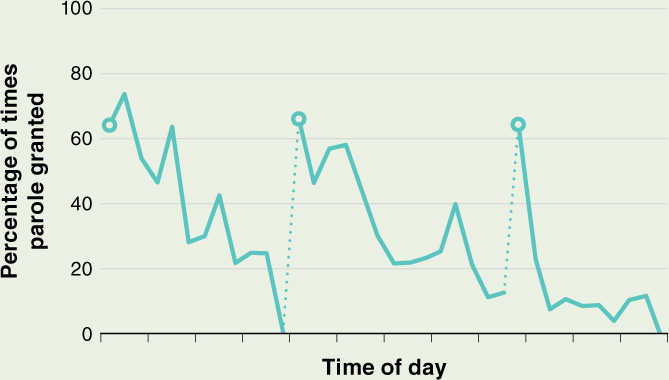A balanced diet is essential for health—
These are important questions. But it can be challenging to approach such complex, subtle processes from an experimental perspective while retaining real-
Three researchers recently reported results from a clever study designed to do just this, evaluating some of the factors that may influence cognitive reasoning. Their approach is an elegant reminder that rigorous scientific thinking and investigation doesn’t necessarily involve a clear “control group” versus “experimental group” comparison.
The researchers examined real-
Can you rephrase that question as a null hypothesis?
Specifically, they set out to determine whether “extraneous factors can sway highly consequential decisions of expert decision makers.” Here’s what they did.
They evaluated all the decisions made by judges presiding over two parole boards in Israel, over the course of 50 days during a 10-
When a prisoner appeared before a parole board, the judge was given the case file, which included information on (1) the number of previous incarcerations, (2) the seriousness of the crime, and (3) the number of months already served in prison. Parole boards did not have any case information prior to the parole hearing.
Each day, each parole board heard 14–
This is a chapter on “Nutrition and Digestion.” Where’s the connection here?
The routine of the parole board hearings is very regimented (and is recorded by a clerk). The judges had a late-
901
Why would anyone care about the “feeding schedule” of the judges?
The researchers were interested in the food breaks because many published research reports present evidence that mental fatigue can interfere with brain functioning. For example, one study reported that car buyers, after being asked to make numerous consecutive decisions about which options they preferred, became more likely to simply accept the default option in subsequent choices. And we know that consumption of food increases blood glucose levels, which can replenish mental resources.
Back to the hypothesis. How did the researchers evaluate whether extraneous factors influenced the judges’ decisions?
Presenting their results in the Proceedings of the National Academy of Sciences, the researchers plotted the proportion of favorable decisions as a function of the time of day the case was heard, as shown below.

They found a clear and dramatic pattern: a parole request was much more likely to be granted at the beginning of the day or just after a food break—
If the null hypothesis were true, what would the graph look like?
Because the order in which cases were presented was random, if the cases were being decided based solely on law and the facts of the case, the probability of a favorable decision should have been the same regardless of what time of day the case was heard.
What can you conclude from these results?
The researchers concluded that legally irrelevant information may influence how a judge rules in such cases. More specifically, they suggested that mentally fatigued, hungry judges fall back on the easier default position of denying a request for parole. Engaging in cognitive reasoning depletes blood sugar, making additional mental effort difficult and unpleasant, while ingesting food restores one’s decision-
What other possible explanations should be explored?
In their analyses, the researchers tested several additional hypotheses. They found that prisoners without previous incarceration were more likely to be granted parole. But the likelihood of getting parole was not influenced by the severity of the crime, the amount of time already served, sex, or ethnicity.
Do these results matter except for prisoners up for parole?
Viewed more broadly—
Can you propose some next steps that should be taken in studying this topic?
TAKE-HOME MESSAGE 22.15
Proper diet and nutrition are necessary, not just for health and fitness, but also for effective brain functioning. Human cognitive reasoning, as demonstrated by judicial decision making, is significantly influenced by hunger and food intake.
Based on the findings of the study, if you had to undergo surgery, would you prefer that your surgeon operate on you after a recent snack break or after having skipped lunch? Why?
Based on the findings regarding the impact of nutritional state on decision making (i.e. the fact that engaging in cognitive reasoning depletes blood sugar, in turn making additional mental effort difficult and unpleasant, whereas ingesting food restores one's decision making abilities), it would probably be best to have one's surgery scheduled only after the surgeon has had a proper, nutritious meal!
902